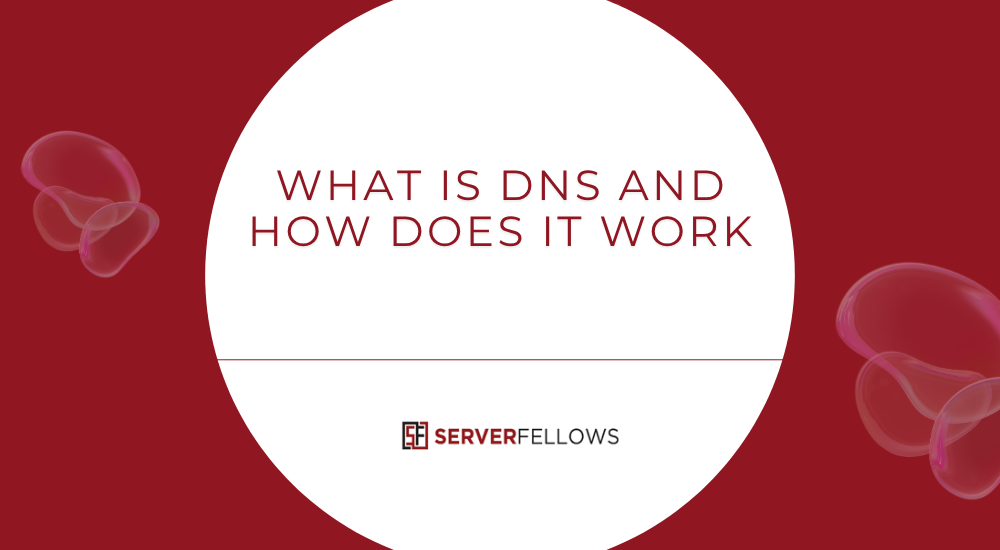
What Is DNS and How Does It Work?
The Domain Name System (DNS) is the digital address book of the internet. Every time someone types a website name into a browser, DNS translates that name into a unique numerical IP address that servers can understand. Without DNS, we’d have to memorize strings of numbers instead of simple website names.
Efficient DNS management is essential for maintaining website speed, uptime, and online security.
What Is DNS?
At its core, DNS converts human-readable domain names—like google.com or serverfellows.com—into IP addresses such as 142.250.72.206. This process is called DNS resolution. When you enter a domain into your browser, your computer queries a DNS server to find the matching IP address. Once found, your browser connects to the website’s hosting server.
Here’s what happens behind the scenes:
- User enters a domain in the browser.
- The DNS resolver contacts multiple servers to locate the matching IP.
- The browser receives the IP address and connects to the correct web server.
- The webpage loads, all within milliseconds.
Why DNS Matters for Websites
1. Speed and Performance
A fast DNS reduces the time it takes for browsers to locate your website. The quicker the DNS lookup, the faster your site loads. Visitors expect instant results, and slow DNS responses can increase bounce rates significantly.
2. Reliability and Uptime
Reliable DNS ensures your site remains accessible even if one server fails. Modern DNS setups use redundant servers across regions to prevent downtime. Businesses that rely on online sales or lead generation must have dependable DNS systems to maintain consistent access.
3. Security Protection
DNS security prevents phishing, spoofing, and DDoS attacks by verifying that visitors reach legitimate servers. With DNSSEC (Domain Name System Security Extensions), websites can safeguard users from malicious redirects or data theft.
4. SEO Impact
Google considers page speed and uptime as ranking factors. A slow or unreliable DNS setup can negatively affect search engine performance. Stable DNS translates to faster crawling, better indexing, and higher rankings over time.
Tip: Consistent DNS performance can directly boost your SEO and user experience.
Types of DNS Records
Each domain includes several DNS records that define how traffic is handled:
- A Record: Maps a domain name to an IPv4 address.
- AAAA Record: Maps to an IPv6 address.
- CNAME Record: Redirects one domain name to another.
- MX Record: Directs emails to mail servers.
- TXT Record: Stores authentication data for security and verification (like SPF and DKIM).
- NS Record: Identifies which servers hold the authoritative DNS information.
Understanding and managing these records properly ensures smooth communication between your domain, website, and email services.
DNS Propagation Explained
When you update DNS records, those changes don’t take effect instantly. DNS propagation is the process where updates spread across global servers. It can take anywhere from a few minutes to 48 hours. Using a well-optimized DNS host reduces this delay, ensuring minimal downtime during changes.
Common DNS Issues
- Slow DNS Resolution: Caused by overloaded or distant DNS servers.
- Incorrect Records: Lead to website or email failures.
- Cache Conflicts: Old data stored in browsers may delay updates.
- Single-Point Failures: Without redundancy, DNS outages can take down your site entirely.
Choosing a reliable DNS provider eliminates most of these issues.
How to Check Your DNS Performance
You can test your DNS using online tools like dig, nslookup, or web-based speed testers. Look for metrics such as:
- Response time under 100ms.
- Zero packet loss.
- DNSSEC enabled.
Monitoring DNS health regularly prevents future performance problems.
FAQs About DNS
Is DNS included with hosting?
Yes, most hosting providers include DNS management. At Serverfellows.com, every plan includes high-performance DNS hosting for seamless website access.
Can bad DNS slow my site?
Absolutely. Poorly configured or slow DNS servers increase lookup time, delaying how quickly your pages load.
Do I need premium DNS?
Yes, if you operate a high-traffic website, e-commerce platform, or global service. Premium DNS offers faster global resolution, advanced routing, and stronger security.
Does DNS affect email too?
Yes. DNS records like MX and SPF ensure your emails are delivered securely and not marked as spam.
Conclusion: The Invisible Engine of the Internet
DNS may be invisible to most users, but it powers every online interaction. It determines how quickly websites load, how secure connections remain, and how stable your digital presence is.
For dependable, high-speed, and secure DNS management, choose Serverfellows.com — where every hosting plan comes with expert-managed DNS for maximum uptime and performance.


